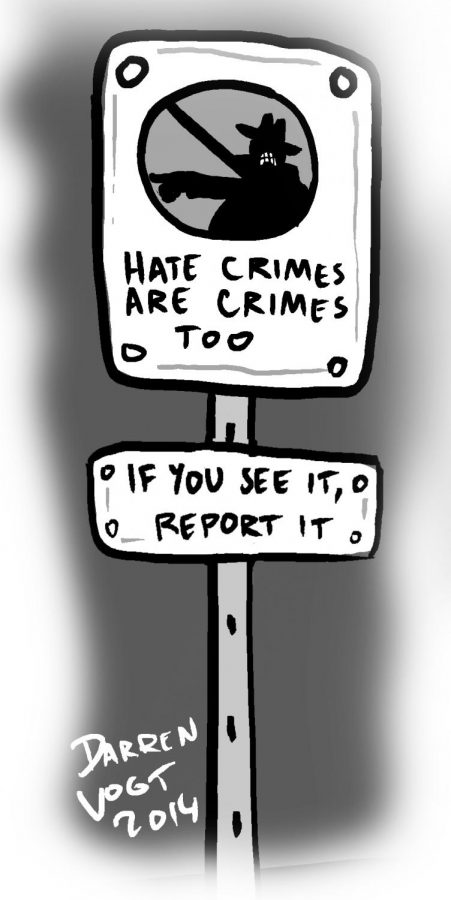EDITORIAL: Break the silence
April 22, 2014
THE ISSUE: As we reported last week, hate crimes still occur today on our campus and beyond, and many go unreported.
OUR STANCE: Hate crimes can no longer go unreported.
According to the most recent FBI statistics from 2012, 5,790 single-bias incidents were reported. Of these reported, 48.3 percent were racially motivated, 19.6 percent were motivated by sexual-orientation, 19.0 percent were motivated by religious bias, 11.5 percent were motivated by national origin/ethnicity bias and 1.6 percent were motivated by disability-bias.
The estimated population of the United States currently is around 300 million people. Statistically, it’s pretty darn likely that more than 5,790 hate crime incidents occurred in one year. It’s numbers like these that prove that reporting hate crimes must occur.
Of course, we know the idea of reporting a hate crime is anything but simple. There may be repercussions for even attempting to report the crime, and the fear of backlash is what likely keeps people from reporting specific crimes.
But in order to attempt to solve the problems of hate crimes, the law needs to know about said injustices.
Witnessing a hate crime and pretending to not notice promotes this behavior, and suggests that the person who committed the crime is not in the wrong — that it’s inevitable that these types of actions will occur so it’s best to just accept it.
We remind you that this way of thinking has allowed for genocides to occur in the past; the most deadly type of hate crime. This type of thinking has driven children to commit suicide thanks to relentless bullying, which is considered a hate crime. This type of behavior shows complacency, and complacency and apathy are the last tools we need in the struggle against hate crimes.
Crimes may start small, such as some form of harassment. According to CNN, in 2013 three San Jose State students were charged with a hate crime against their black roommate after they put a bicycle chain around his neck and decorated his room with the Confederate flag and Nazi symbols.
The students were obviously reported, and were suspended for the actions. One member of the team was even arrested.
Not all hate crimes occur physically, however. With the power of the internet beneath our fingers, hate crimes are as easy as an anonymous message on Tumblr or a hateful message from a fake Facebook account.
However, with all of these improvements in technology, reporting hate crimes can be easier than ever, with information about the state of hate crimes available to anyone with Internet access. Education can help lead people one step closer to compassion, education and action.
So read up.
Keep a sharp eye.
And let hate crime perpetuators know that there are serious consequences for action motivated by nothing more than hate.
This editorial represents the majority opinion of the Herald’s 9-member editorial board.

























